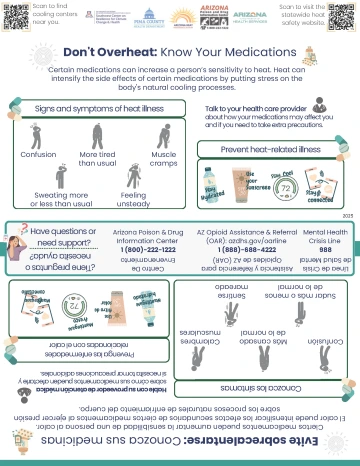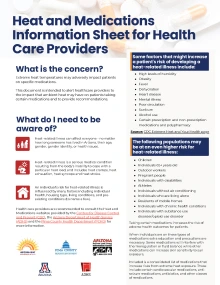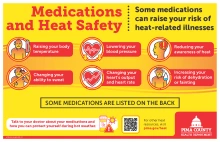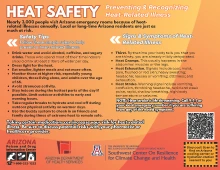Heat is the leading cause of weather-related deaths in the United States. Heat also impacts how our bodies function when we are exposed to extremely high environmental temperatures. The medications we take can also increase our risk to developing heat related illness by influencing how our body responds to heat. In partnership with the Arizona Department of Health Services, SCORCH has convened a Heat and Medications Taskforce to build awareness of this issue among the broad health care provider community and the public.
Dzdfdbzxcbzxcb
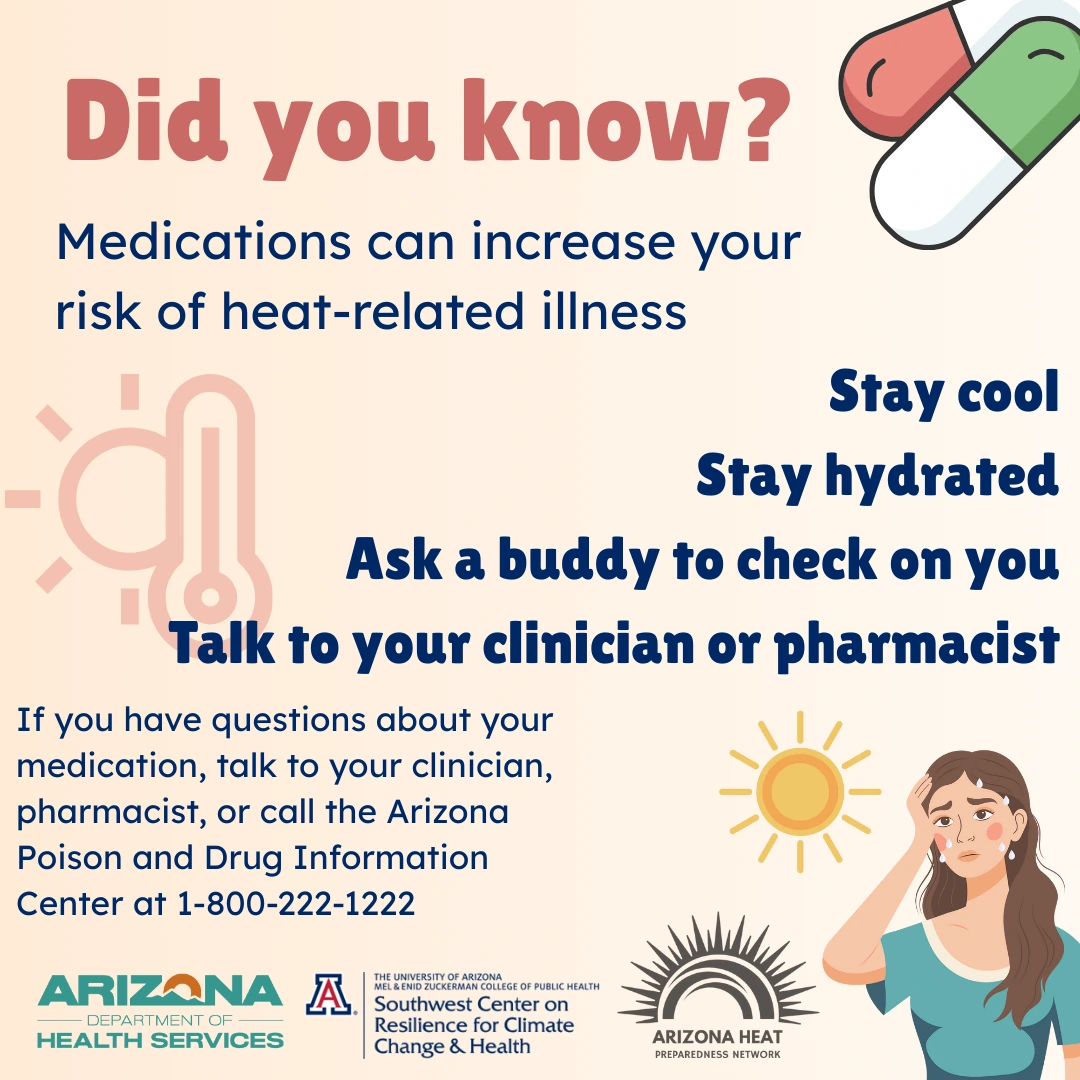
| Did you know? (PNG) Heat and Medications Infographics Plain language infographics relay that taking certain medications can increase the risk of developing heat related illness during the extreme heat season, offer tips to decrease those risks, and provide guidance to reach out to a clinician, pharmacist, or the Arizona Poison and Drug Information Center for questions about medications and extreme heat. Content for these plain language infographics was developed by the Arizona Heat and Medications Task Force and designed by the Arizona Department of Health Services for the purpose of building community awareness about this serious issue. ¿Sabias que? (PNG) Infografía sobre el calor y los medicamentos Las infografías en lenguaje sencillo transmiten que tomar ciertos medicamentos puede aumentar el riesgo de desarrollar enfermedades relacionadas con el calor durante la temporada de calor extremo, ofrecen consejos para disminuir esos riesgos y brindan orientación para comunicarse con un médico, farmacéutico o el Centro de información sobre intoxicaciones y medicamentos de Arizona si tiene preguntas sobre medicamentos y calor extremo. El contenido de estas infografías en lenguaje sencillo fue desarrollado por el Grupo de trabajo sobre calor y medicamentos de Arizona y diseñado por el Departamento de Servicios de Salud de Arizona con el propósito de crear conciencia en la comunidad sobre este grave problema. |
Image
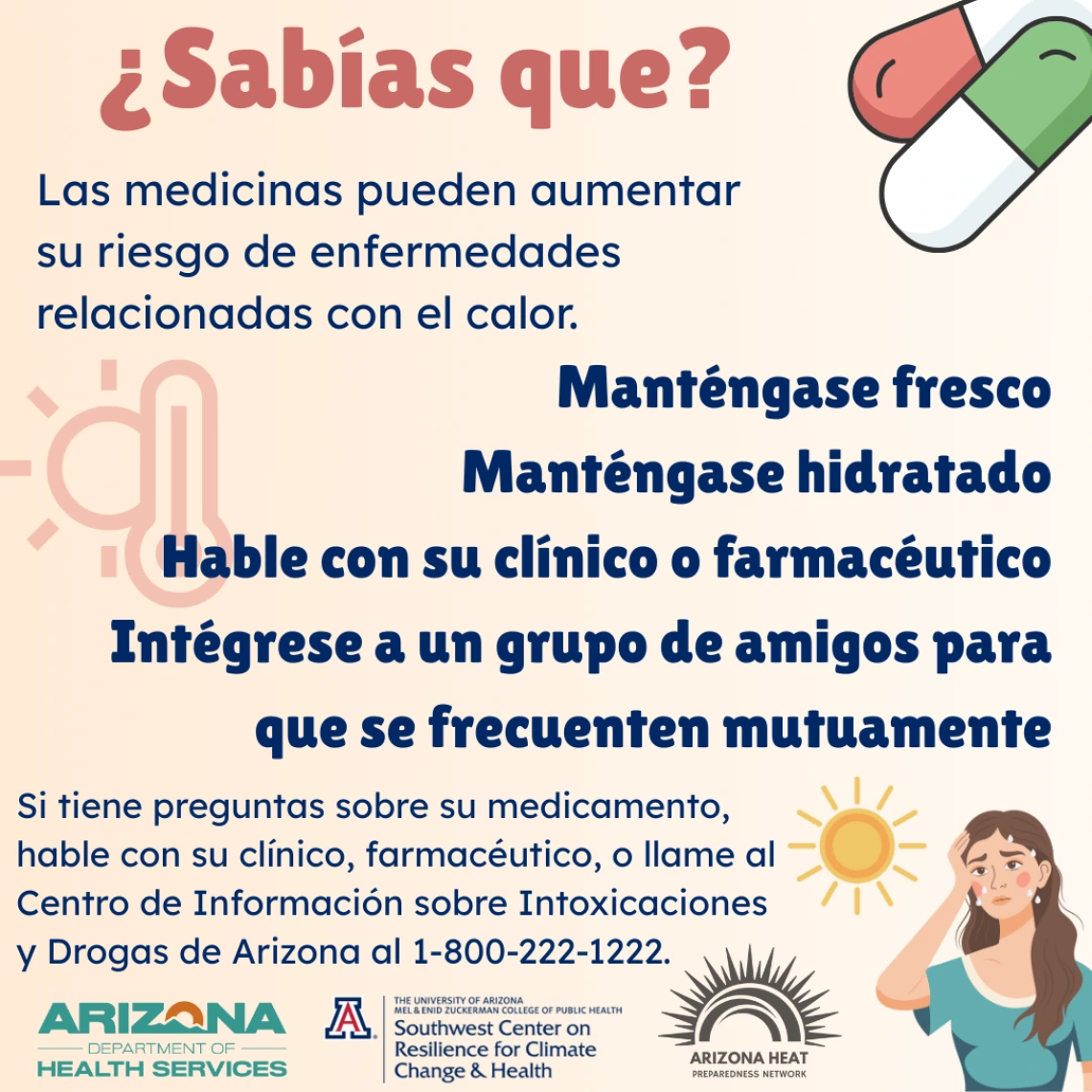
|
University of Arizona, Mel and Enid Zuckerman College of Public Health
Mona Arora, PhD (Lead) Assistant Research Professor, Multiple Principal Investigator for SCORCH, Community Engagement Core Lead
Kacey Ernst, PhD Professor & Department Chair, Epidemiology and Biostatistics, Multiple Principal Investigator for SCORCH
Bridget Murphy, DBH, MEd Assistant Research Professor, (Center for Rural Health)
Arizona Department of Health Services
Jennifer Botsford, Bureau Chief, Resiliency and the Environment
Eugene Livar, MD, Chief Heat Officer
Pima County Health Department
Amanda Anderson, MPH, RS, Emergency Mitigation and Preparedness Division Manager
Mark Person, Program Manager II, Community Mental Health & Addiction and Injury Division
Arizona Community Health Workers Association, Inc.
Richard Redondo, PSIO BS, CHW, Research & Programs Manager
University of Arizona, Arizona Poison and Drug Information Center
Cori Cantin, BSPH, CHES, Community Outreach Coordinator
Steve Dudley, PharmD, DABAT, Director
Alexander James Jasensky
University of Arizona, College of Medicine
Brian Drummond. MD, FAAEM, Clinical Professor, Emergency Medicine - (Clinical Series Track), Department of Emergency Medicine
Harry McDermott, MD, MPH, Physician and Public Health Officer, Campus Health Service, Professor, Division of Health Promotion Sciences, Mel and Enid Zuckerman College of Public Health, Professor, Family and Community Medicine, College of Medicine The University of Arizona
University of Arizona, College of Pharmacy
Christopher Edwards, PharmD, BCPS, FASHP, Associate Clinical Professor, Dept. of Pharmacy Practice and Science, Clinical Assistant Professor, Emergency Medicine, College of Medicine University of Arizona
Elizabeth Hall-Lipsy, JD, MPH, Assistant Dean of Academic Affairs and Assessment, College of Pharmacy, University of Arizona
University of Arizona College of Nursing
Kristie Hoch, DNP, CRNA, MS, FAANA, Associate Clinical Professor, Program Administrator, Nurse Anesthesiology Specialty



